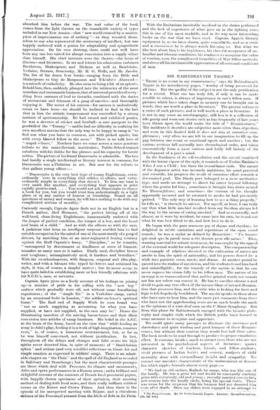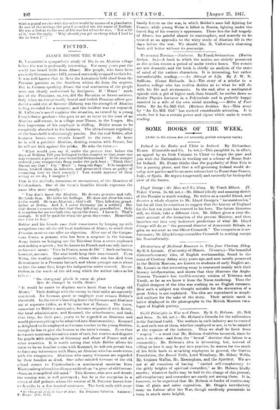SIR RABINDRAXATH TAGORE..
"Tame is no event in my reminiscences," says Sir Rahandranath Tagoro in his introductory pages, " worthy of being preserved for all time. 13ut the quality of the subject is not the only justification for a record. What ono has truly felt, if only it can be mule sensible to others, is always of importance to 0110.13 follow-mien. If pictures which have taken shape in memory can he brought out in words, they are worth a place in literature." The present velum, is a series of such pictures, and is well worth a place in literature. It is not in any sense an autobiography, still loss is it a collection of idle gossip and worn-out stories such as has frequently of late years been thrust upon the world under the title of " Reminiscences." The incidents it describes are subjective more often than objective, and even in this limited field it does not aim at narrative com- pleteness; you' often wo are left to our imagination to fill up the gap between ono event or emotional epoch and another ; but the various sections fall naturally into chronological order, and taken consecutively form a most curious and fairly full history of the development of a poet's mind.
In the frankness of its solf-rovelatitnt and the naireli combined
with the latent vigour of the style, it re Is I.14 of Yoshio Markine'a When I was a Child ; but there the resemblance ends. The nature of the Japanese artist was intensely ambitious, his mind practical and miontific, his progress tho result of conscious effort towards a deter lit d goal. 'rho Hindu poet belonged to a more meditatis o typo, and made no attempt to direct his career beyond following whore his genius led him ; somotimos it brought lam clown mental No Thoroughfares, and sonsetimos tho current of Ian thought apparently reversed and Ito returned to meshes he had previously quitted. " The only way of learning how to use a thing properly," he tolls us, " is through its misuse. For myself, at least, I can truly say that what little mischief resulted from my freedom ale-aye led the way to the means of curing mischief." And so eventually, and almost, as it wore by accident, he came into his own, lie found out what he was best fitted to do, and how best to do it.
He began with the pure sensuous joy of rhyme and rhythm ; his delighted in subtle variations and repetitions of the open vowel sounds: he was a stylist as defined by Bnmetiare "tin holism"
qui croit quo Is parole a Ott) donne° pour ollosnOure." Then, wanting material for artistic troatmont, he was caught by the appeal of the external world for adequate deseription. The companionship and example of relatives devoted to the cultivation of native art awoke in him the spirit of nationality, and his powers flowed ft, a while into patriotic verse, music, and drama. At another period be passed into the realms of neyatieisni, and his students found hint herd and unintelligible ; for the tragedy of Um mystic is that he can never express his vision fully to his fellow-nem. The nature of his message is so transcendental that neither printed words nor somata nor line nor colour can convoy it. Ile has to sacrifice clearness and detail to gain any Into effect of the intense blaze of inward illumina- tion that possesses I l i lll , and the critic who is looking for facts and logic is loft hopelessly bewildered. The mystic speaks to those alone who have oars to hoar him, and the most just comments from those who have not the apprehending sense aro as much beside the mark as the opinions of a tonatleaf man on the C Minor Symphony. But from this phase Sir Rabindranath emerged with the broader philo- sophy and simpler style which the British public have learned in soma measure to recognize and appreciate.
We could quote many passages to illustrate the sweetness and shrewdness and quiet wisdom and good bentour of those Reininis- omens, but without their context they untold lose half their salt., The book needs to be road through to proiluro its propor ennollativo effect. It contains, besides, much to attract 0,1`11 those who are not interested in lho psychological imports of literature quaint character sketches of teachont friends, and fellowatudents, vivid pictures of Indian habits and neenery, analyses of child mentality dono with extraordinary insight and sympathy. Wa extract one anocilots charactorintic of the undercurrent of denier° fun which ripples beneath almost every page We had an old cashier, Kailaah by mune, who was like one of the family. Ho was a great wit and would be constantly cracking jokes with everybody, old and young ; recently married moms-in-law, now-comers into the family circle, hating his special butts. Thom. was room for the suspicion that his humour had net deaorted hint even after death. One,o my elders swore engaged in an attempt to • ves Renlinifttneer. Do Sir fin:dish:ninth Tasore. London: MACUlill. flUti Va. pis. sal. taw
start a postal service with the other world by moans of a planchette. At ono of the sittings the pencil serawled out the name of Kailash. Ho was asked as to the wet of life one led where ho was. ' Not a bit of it,' was the reply. Why should you get so cheep what I had to die to learn ? ":



























 Previous page
Previous page